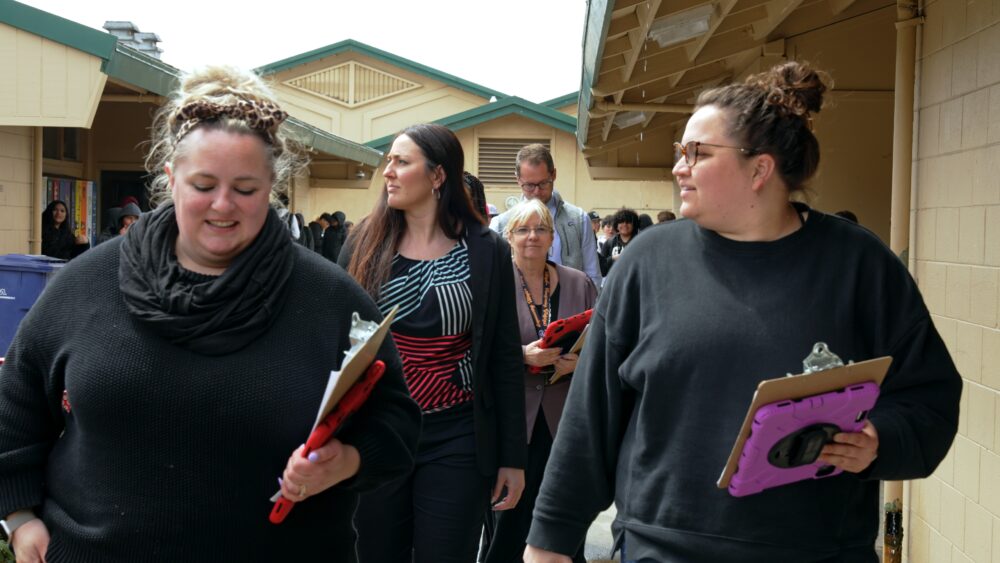Lasting Change, Built Together
What We Learned from Supporting Curriculum Implementation in Guilford County Schools (GCS) and Monterey Peninsula Unified School District (MPUSD)

Every student deserves the kind of grade-level instruction that challenges, supports, and engages them every day. That kind of consistency doesn’t happen by chance. It takes strong, steady leadership and a commitment to doing the hard work of implementing curriculum effectively. It is not just about selecting high-quality instructional materials (HQIM) but also about building the systems, skills, and mindsets to implement them well. Over the past three years, UnboundEd partnered with leaders in Guilford County Schools (GCS) and Monterey Peninsula Unified School District (MPUSD) to do just that. Together, we built capacity from the central office to the classroom, so that great materials could translate into great instruction.
UnboundEd undertook this work as part of the Effective Implementation Cohort (EIC) grant, a project designed to help school districts implement an instructional system that supports using high-quality middle school math curriculum.
A newly released independent evaluation confirms the effectiveness of that foundation: greater instructional coherence, stronger leadership, and promising signs of sustainability that will ensure the impact of the project will stretch well beyond the life of the partnership.
Now, with a multi-year evaluation conducted by Education Analytics (EA) in hand, we have the data and stories to understand what worked, what changed, and what still lies ahead.

Read Education Analytics' EIC Report
Read the Full Report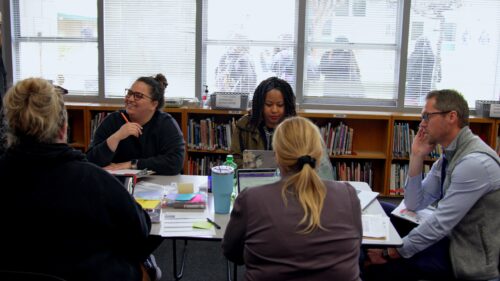
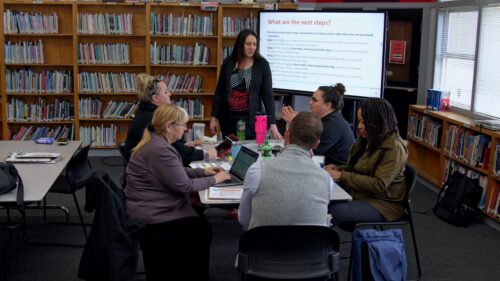
Building Capacity That Lasts
We began this partnership under the premise that materials alone don’t transform instruction; people do. So our model was never just about curriculum — it was about systems-level leadership. Through ongoing support, coaching, and collaborative planning, we helped district and school leaders:
- Develop a shared vision for instruction aligned with their chosen curricula (Open Up Math in GCS and i-Ready in MPUSD)
- Build implementation teams that could carry the work forward
- Create professional learning structures tied directly to instructional materials
- Institutionalize regular classroom walk-throughs centered on integrity, not compliance
Our foremost focus was creating systems that work because they’re built with the people who will sustain them.
And the results? Both districts reported increased leadership capacity, better data systems, clearer expectations for teachers, and stronger alignment across departments and initiatives. In GCS, walk-throughs became a standard approach. In MPUSD, district leaders credited UnboundEd’s support with making their instructional vision tangible.

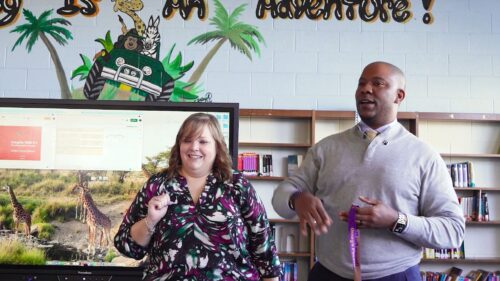
When Instructional Leadership Grows, Teacher Support Follows
In both districts, school leaders developed greater confidence and clarity in how they supported teachers. They gained hands-on experience with the curriculum, used shared rubrics to calibrate what implementation should look like, and participated in learning walks that sharpened their instructional lens. According to leaders, this resulted in a stronger school-wide culture of instructional leadership. Additionally, in both districts, the majority of surveyed teachers reported that their school leaders:
- Set clear expectations for curriculum use
- Conducted observations beyond formal walk-throughs
- Offered actionable feedback aligned with the curriculum
Even more telling: in GCS, more than 85% of teachers said their math professional learning was clearly connected to their curriculum and daily instruction. That’s a testament to the way school leaders took ownership of the work and translated it into real, day-to-day support.
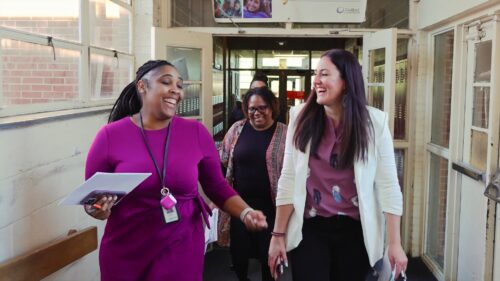

Integrity Takes Time — and It’s Worth It
Implementing a new curriculum isn’t a switch you flip. It’s a series of practices that develop over time. That’s why we worked closely with district and school teams to build a cycle of professional learning, walk-throughs, and reflective planning that kept everyone focused on progress.
Each year, UnboundEd-led “Integrity Walks” collected data on how often and how well the curriculum was being implemented to offer guidance to district leaders. By year three, we saw significant growth:
- In both districts, 90% of observed classrooms were using the curriculum as designed
- Ratings of implementation integrity steadily improved across all schools
- Feedback cycles led to observable shifts in teacher practice and instructional quality
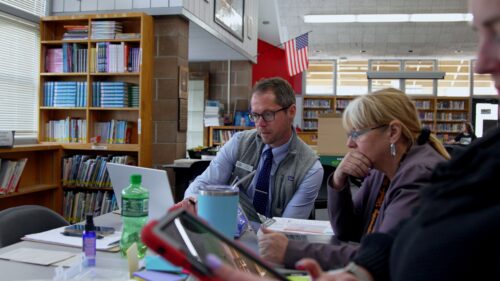
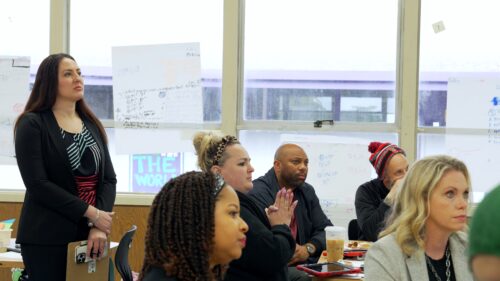
Scaling the Work Beyond the Cohort
One of the most hopeful findings in the EA report is that both GCS and MPUSD are not only sustaining this work, they’re expanding it.
District leaders reported plans to use what they’ve learned to scale implementation across new grade levels and subjects. The structures, systems, and relationships built through the EIC project are now guiding decisions in other areas. This is what systems change looks like: not just short-term wins, but long-term shifts in how a district supports great teaching.
The Challenges Are Real — But So Is the Commitment
Of course, the work hasn’t been easy. Leadership turnover, competing priorities, and capacity constraints remain challenges. But across interviews and survey data, one theme stood out: a shared commitment to keep going. Educators in both districts saw this work not as one more initiative, but as the foundation for all other instructional efforts.
In MPUSD, a smaller district with fewer resources, the impact was especially notable. Leaders shared that without UnboundEd’s support, this level of sustained and coherent curriculum implementation wouldn’t have been possible.

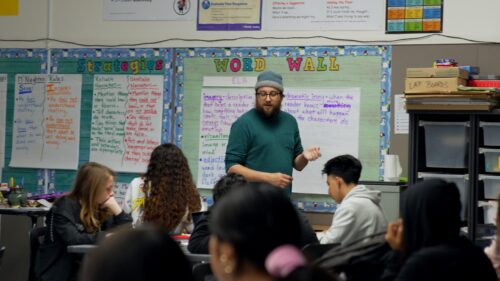
Lessons We’ll Carry Forward
This work reminds us that real change doesn’t happen overnight. It happens when we trust educators to lead, equip them to do so, and create the conditions for their success. From this project, we’ve learned:
- Implementation is a leadership practice. When leadership is clear, consistent, and grounded in evidence, teachers thrive.
- Data matter, but so does culture. Walk-through tools and dashboards help track progress, but shared language and aligned mindsets make implementation stick.
- Sustainability starts on day one. By designing with the end in mind — building capacity, not dependency — we help systems own their own growth.
A Decade In, Still Committed to the Work
As we celebrate 10 years of UnboundEd, this evaluation is more than a reflection. It’s a validation of what we’ve always believed: that every student deserves grade-level, engaging, affirming, and meaningful instruction — and that supporting the adults who make that instruction happen is the surest path to equity.
To our partners in GCS, MPUSD, and EA, thank you for your courage, commitment, and trust. The changes you’ve made will echo far beyond this project. And to every district wondering whether transformational curriculum implementation is possible, we’re here to say: Yes. It is.

Read Education Analytics' EIC Report
Read the Full Report
